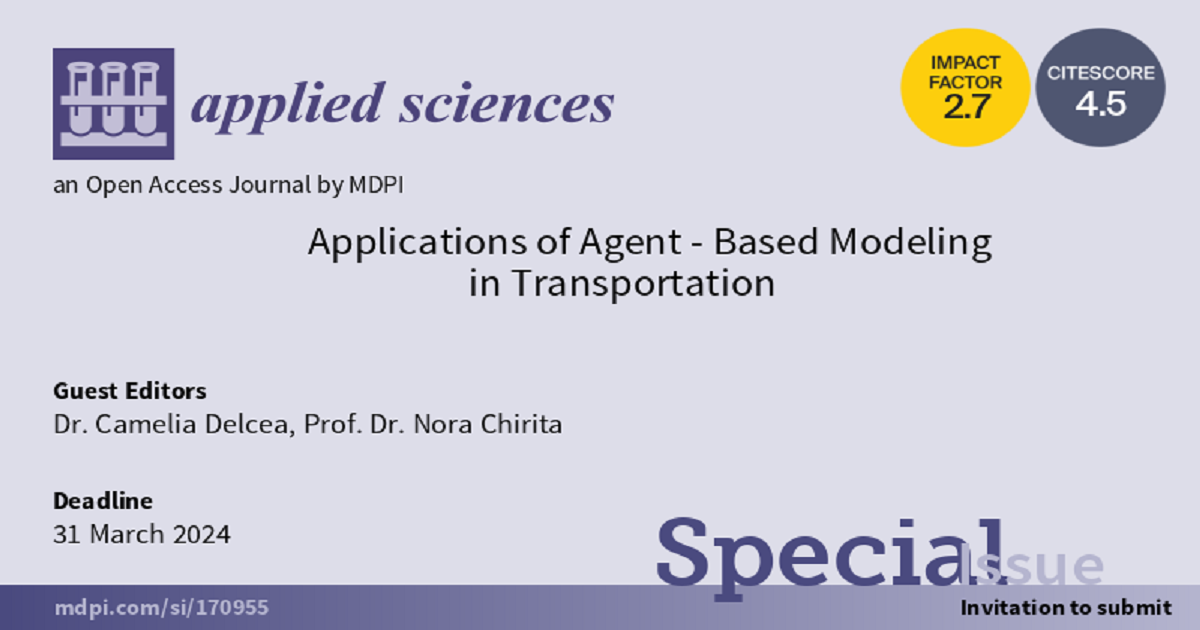Applications of Agent-Based Modeling in Transportation
A special issue of Applied Sciences (ISSN 2076-3417). This special issue belongs to the section "Transportation and Future Mobility".
Deadline for manuscript submissions: closed (31 March 2024) | Viewed by 2073

Special Issue Editors
Interests: cybernetics; fuzzy theory; grey systems theory; operations research; strategic management; computational intelligence; business analysis; agent-based modelling
Special Issues, Collections and Topics in MDPI journals
Interests: cybernetics; strategic management; computational intelligence; business analysis; agent-based modelling; transportation; risk assessment; systems analysis and diagnosis
Special Issue Information
Dear Colleagues,
Agent-based modeling has succeeded in providing the needed framework for modeling various aspects related to our everyday life, both in normal and pandemic life conditions. Transportation represents one of the base structures of our modern life as it ensures the proper movement of goods, people and animals from one location to another, either by air, sea, road, cable, pipeline or space. In this context, the Special Issue is dedicated to the practical applications of agent-based modeling in transportation and plans to give an overview of the most recent advances in this field. This Special Issue is aimed at providing selected contributions on advances in both transportation by means of agent-based modeling or other similar modeling techniques. Additionally, the authors are encouraged to submit papers addressing the state-of-the-art or case studies featuring practical applications of agent-based modeling in transportation under various conditions.
Potential topics include, but are not limited to:
- Role of agent-based modeling in transportation
- Conceptual frameworks for agent-based modeling in transportation
- Agent-based simulation in transportation
- Agent-based optimization of transportation
- Advancements in agent-based modeling and/or similar modeling techniques in transportation
- Hybrid approaches in transportation modeling
- Specific applications in transportation solvable using agent-based modeling and/or similar modeling techniques
- Practical case studies
Dr. Camelia Delcea
Prof. Dr. Nora Chirita
Guest Editors
Manuscript Submission Information
Manuscripts should be submitted online at www.mdpi.com by registering and logging in to this website. Once you are registered, click here to go to the submission form. Manuscripts can be submitted until the deadline. All submissions that pass pre-check are peer-reviewed. Accepted papers will be published continuously in the journal (as soon as accepted) and will be listed together on the special issue website. Research articles, review articles as well as short communications are invited. For planned papers, a title and short abstract (about 100 words) can be sent to the Editorial Office for announcement on this website.
Submitted manuscripts should not have been published previously, nor be under consideration for publication elsewhere (except conference proceedings papers). All manuscripts are thoroughly refereed through a single-blind peer-review process. A guide for authors and other relevant information for submission of manuscripts is available on the Instructions for Authors page. Applied Sciences is an international peer-reviewed open access semimonthly journal published by MDPI.
Please visit the Instructions for Authors page before submitting a manuscript. The Article Processing Charge (APC) for publication in this open access journal is 2400 CHF (Swiss Francs). Submitted papers should be well formatted and use good English. Authors may use MDPI's English editing service prior to publication or during author revisions.
Keywords
- agent-based modeling
- agent-based simulation
- agent-based optimization
- transportation
- case studies in transportation






